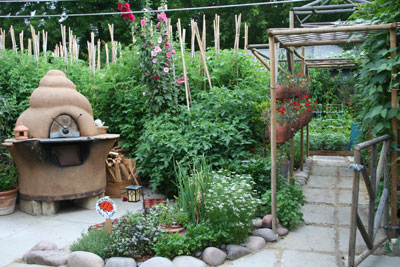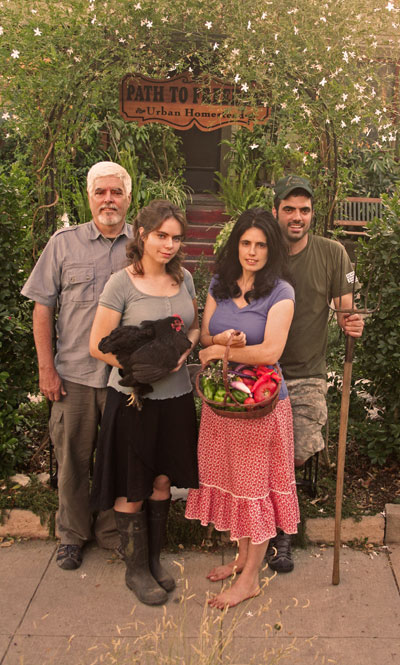Urban Homesteads and Hope
The concept of “urban homesteads” is gaining popularity in recent years. To put it simply, modern-day pioneers are living as self-sufficiently as possible to protect the earth.
They live in the midst of all of the contemporary amenities, but choose not to participate in them, or at least as little as possible. They practice gardening and grow most, if not all of their own foods. They keep animals to give them milk and eggs. Some even convert their vehicles to diesel engines and brew their own bio-diesel fuels.
In an effort to unearth the appeal of urban homesteads, we caught up with the founder of the Urban Homestead movement, Jules Dervaes. We were reminded of a very important message: Each and every one of us can help make one aspect of our life more earth-friendly with minimal effort. All it takes is the decision to make a difference!
—————————————————————————————————–
Before he founded the The Path to Freedom movement in Pasadena in 2000, Jules Dervaes homesteaded in the New Zealand outback and rural Florida, where he had lots of land to work with. Coming to Pasadena with his family, he had to shrink his operation from 10 acres to an area that, if you subtracted the house, was one-tenth of an acre.
In the beginning, the Dervaes family goal was simple: to survive. And within a few years, they realized their plan was working. They also saw potential to turn their homestead into an outreach program so others could benefit. They began a Web site, www.pathtofreedom.com, which expanded to include a daily blog. A revolutionary idea at the time, the blog chronicled the family’s day-to-day experiences.
Today, their homestead in Pasadena can claim some amazing stats.

Annually they produce around 3 tons of fruits and vegetables, 1,780 chicken and duck eggs and 25 pounds of honey. Additionally they have produced 1,500 gallons of bio-diesel fuel since 2004 and over 11,500 kwh of solar power produced since 2003. Not too bad for one-fifth of an acre.
When the Web site began to grow, they realized the value of a social networking site just for gardeners, and www.freedomgardeners.org was born. The site has over 6,000 members from around the world and provides a forum where gardeners can help each other.
Post: What costs are involved in getting started?
Dervaes: We were on a budget and things were expensive here, so we went on the cheap. We’d collect bed frames and turn them in to trellises, and turn river rock and glass bottles into edging. I wanted to show that every family could do this, without having to be rich. We were always trying to find the least expensive way to have things done. You don’t have to be rich to take care of the environment.
Post: How can people educate themselves on gardening?
Dervaes: Pepper your local nurserymen with questions: What grows in your neighborhood? What are they selling? They’re making a business out of it. They know what works, or else you wouldn’t come back. Look around your neighborhood (to your neighbors and see what works for them.)
He also encouraged people to join the networking site. He described www.freedomgardeners.org as “a facebook for gardeners only.”
Post: You refer to the practice of “being neighbors.” What do you mean by that?

Dervaes: I try to think of the spirit of neighborliness, like the Amish do. Your neighbors are your extended family, and they’re there for you like you are there for them, and you can’t charge for that. We didn’t want to be a business of neighbors. We wanted to be really, truly neighbors.
He talked about modern life and its fast pace. While we can be driven by the need for instant gratification, he observed, gardening is, in many ways, the opposite of this lifestyle. It takes patience and time, but the rewards are worth it, and the changes in life it encourages are also valuable.
“Unfortunately, in America, we think you have to be big, fast,” Dervaes notes. “An instant makeover. But nature works in a different way. It takes 500 years for nature to make an inch of soil. So you have to look at it in a slower perspective; we have to slow it down. Slow food. Some of my food takes 30-60 days to get to the table. You have to reduce your expectations.”
Post: What do you hope your children will learn from gardening, homesteading, and the Path to Freedom?
Dervaes: What I’m doing here gives me hope. I couldn’t take the bad news in the newspapers and the Internet and everywhere, unless I could do something about it, and growing a garden gives me hope, and it gives my children hope. They have something to do. Because it’s the hopelessness and helplessness when they give you bad news and you throw up your hands and say “What can I do about it?” This gives you a direction, and with that direction comes hope.
Who couldn’t use a little hope in this modern world? For Jules Dervaes, gardening is a first step towards a greater step, and his life is an example of that.
For more information, visit www.pathtofreedom.com.